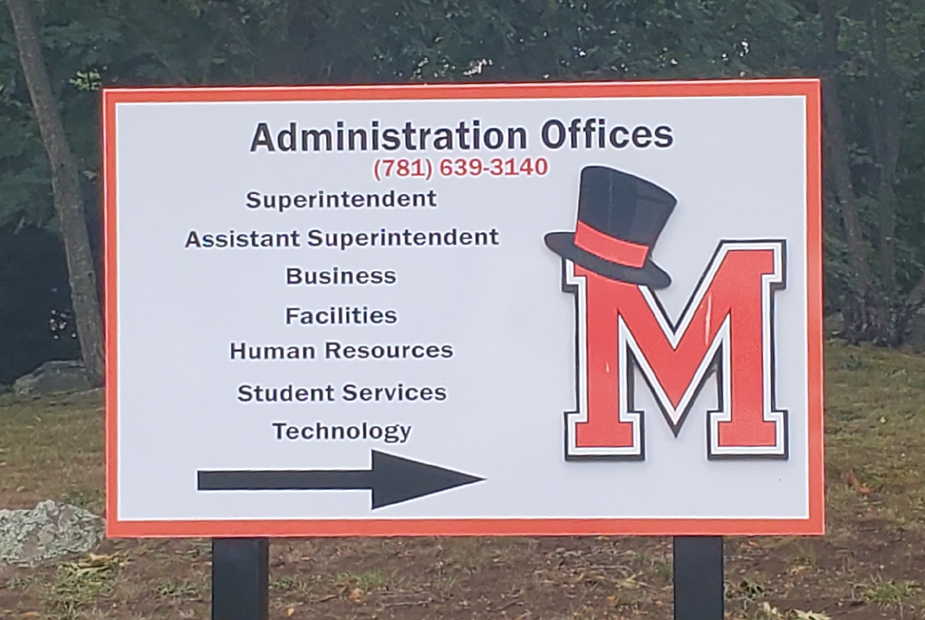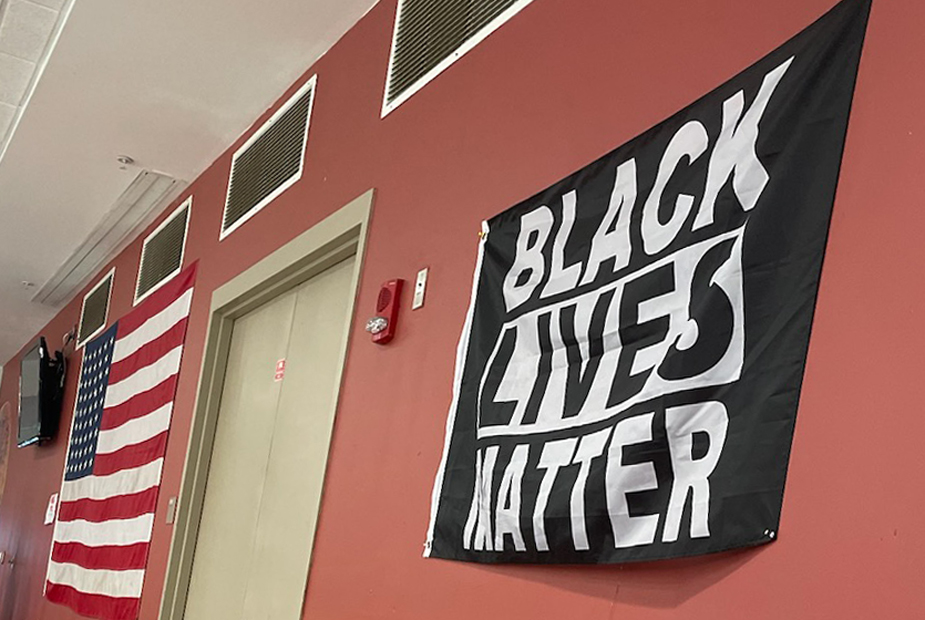What Went Wrong? Perspectives on the Superintendent Saga
Despite the beautiful summer weather enticing Marbleheaders to take a break from politics, the last several weeks have been filled with often divisive discussions surrounding the School Committee and John Buckey’s role as the superintendent of the Marblehead Public Schools.
In a joint press release dated August 2, 2023, the School Committee and Buckey wrote that they had reached “an acceptable agreement resulting in his resignation.” The tone of the announcement was positive, stating that “Dr. Buckey deeply appreciates the opportunity to have served his community,” and that “the Marblehead Public School Committee thanks Dr. Buckey for his three plus years of service” and “wishes him the best as he pursues other opportunities in the field of education.”
Buckey also released his own statement to another local news outlet in which he stated that he came to Marblehead during the Covid pandemic at a time that “the district was relying on outdated tools, technology, processes and practices.” He outlined what he sees as his accomplishments, including significant academic progress, new curricula, and updated technology as well as “ensuring that all students were receiving rich, robust, state-of-the-art instruction.”
The legalese
 The concrete details are relatively clear. Per the terms of the settlement agreement, Buckey will remain employed by the district and will continue to receive his regular paycheck until December 31, 2023, though he will be on administrative leave during that time. Michelle Cresta – current assistant superintendent of operations and finance – will serve as acting superintendent until the School Committee appoints an interim or permanent replacement.
The concrete details are relatively clear. Per the terms of the settlement agreement, Buckey will remain employed by the district and will continue to receive his regular paycheck until December 31, 2023, though he will be on administrative leave during that time. Michelle Cresta – current assistant superintendent of operations and finance – will serve as acting superintendent until the School Committee appoints an interim or permanent replacement.
On January 2, 2024, Buckey will receive a lump sum payment of $94,350. As part of the settlement, Buckey agreed to waive the right to file a lawsuit against the district or any of the individual members of the School Committee. Additionally, both he and the School Committee agreed they will not disparage each other.
At the time of his resignation, Buckey had approximately two years left in his contract, through the summer of 2025. Although he was hired in 2020 with a three-year contract, it was extended an additional two years in the summer of 2021 by a four-to-one vote of the then-serving School Committee, with only current School Committee Chair Sarah Fox dissenting.
But questions remain, and they continue to be asked in numerous social media posts, comments, letters to the editor of Marblehead Beacon and other news outlets, and conversations taking place all over Marblehead.
We may never know the full answers – in large part due to the non-disparagement clause in the agreement – and people of good conscience will likely continue to disagree on how this process was handled and whether or not it should have taken place at all. To the extent that Marblehead seeks to break the trend that has brought us so many different superintendents in recent years, an analysis of key elements of the process seems prudent.
Was this a termination or a resignation?
The press release referenced above refers to the separation as a “resignation,” but this is an oversimplification. Buckey’s contract specifies four options for terminating his role as superintendent: (1) by the committee with good cause, (2) early termination provision, (3) for disability, and (4) by the superintendent.
We have no information suggesting that option three – for disability – is relevant, leaving three remaining possibilities.
Option four – resignation by the superintendent – is the official designation, though some aspects of the agreement make this confusing. For example, the contract specifies that, if a superintendent resigns, “the Committee shall not be required to pay, and the Superintendent shall not be entitled to receive salary payments and benefits.” By contrast, the signed settlement agreement pays Buckey through the end of the year in addition to a lump sum payment of $94,350. This leaves some wondering: what benefit does the town receive in exchange for a payout not required by the contract?
Interestingly, this lump sum aligns exactly with the amount specified for option two – early termination. This option provides the School Committee the power to terminate the superintendent’s contract without offering any reason, provided they pay $94,350 and give 100 days’ notice (or pay the equivalent salary for this amount of time). The 100 days would have entitled Buckey to compensation through mid-November 2023. Instead, the settlement agreement pays him through the end of December, an additional 50 or so days that correlates with approximately $25,000. In other words, early termination under option two would have cost the school district approximately $145,000 to implement. Instead, the negotiated resignation will cost approximately $170,000.
There was, of course, one more option available. Option one – by the committee for good cause – is defined in Buckey’s contract as termination due to “insubordination, incompetency, neglect of duty, or other good cause.” This option includes the requirement that the School Committee provide the superintendent with written notice of the “reason, reasons, charge or charges” and hold a hearing to “be conducted in accordance with the provisions of the Open Meeting Law.” While the contract notes that “the decision of the Committee, after such hearing, if any, shall be final and binding,” it is also “subject to such judicial review as may be provided under applicable law.” Termination “for good cause” thus might have opened the school district to the potential for a legal suit.
While option two – early termination without cause – allows significant latitude, it does in this circumstance potentially also include some legal risk. Tom Scott, the co-executive director of the Massachusetts Association of School Superintendents (MASS), told Marblehead Beacon that it is very unusual for a superintendent’s contract to include a “no cause” termination option, and if implemented, this approach would open up “multiple grounds” for Buckey to sue the district. Notwithstanding Scott’s perspective that it is “very unusual,” Buckey did sign two contracts including this clause, and it is unclear if there would have been meaningful legal exposure if the School Committee had exercised its right to terminate him without cause instead of negotiating a settlement that permitted him to resign.
It appeared at one point that the School Committee might actually be taking this path when a public meeting was scheduled for Wednesday, July 26, 2023, with “Superintendent Contract - Early Termination Clause (vote)” as the sole item on the agenda. However the meeting was abruptly canceled immediately after it started. School Committee Chair Sarah Fox read a statement stating, “We are no longer going forward with the meeting tonight due to last minute communication between counsel.”
The School Committee then met in executive session on Monday, July 31, 2023, and the press release announcing Buckey’s resignation was issued on Wednesday, August 2.
As noted above, the settlement agreement includes several clauses that protect both Buckey and the school district, including a release statement whereby Buckey promises not to pursue any legal claims against “the Marblehead Public Schools and the Marblehead School Committee (individually, and as a whole)” and a mutual non-disparagement clause specifying that both parties will “state publicly and privately that they have reached an amicable agreement to conclude the employment relationship.”
Why did these discussions take place behind closed doors?
Early last week, Marblehead resident Cathyann Swindlehurst filed a complaint with the Massachusetts Office of the Attorney General alleging that “the Marblehead School Committee violated the Massachusetts Open Meeting Law when it decided, outside of the public view, to consider exercising the termination for convenience clause in the current Superintendent’s employment agreement.” Swindlehurst used the phrase “termination for convenience” to refer to option two in Buckey’s contract – the no-cause termination option.
As Marblehead Beacon previously reported, there are very specific guidelines included in Massachusetts General Law Chapter 30A for when a School Committee is permitted to meet in executive session, including a provision allowing them “to conduct strategy sessions in preparation for negotiations with nonunion personnel.” This was the reason given for the executive sessions held to discuss the superintendent’s contract on July 21st and again on July 31st. As already noted, the one public School Committee meeting scheduled to discuss the contract was abruptly adjourned prior to any public participation. This last-minute change – coupled with the fact that the two other meetings took place in private – have fueled complaints about lack of transparency on the part of the School Committee with regard to the entire decision-making process.
While the open meeting violation complaint filed by Swindlehurst has not yet been ruled on by the Attorney General's office, it is true that contract negotiations – such as those resulting in Buckey’s resignation – generally constitute an exception to open meeting law requirements while a decision to terminate either with or without cause does not. As we now know, the School Committee and Buckey officially reached a resignation rather than a termination agreement.
New questions have been raised recently about whether the settlement agreement itself required a vote in open session, even if the contract negotiations could be conducted privately. Fox told Marblehead Beacon that the School Committee attorney – Colby Brunt of Stoneman, Chandler, and Miller LLP – “previously thought this wasn’t needed.” However, Fox continued, “our attorney reached out earlier to ask me to put ratification of the settlement agreement on a [School Committee] agenda out of an abundance of caution.” The next School Committee meeting is scheduled to take place in person and on Zoom starting at 12 noon on Friday, August 11, 2023. The agenda includes "Ratification of Separation Agreement (vote).
Why did the School Committee want to part ways with Buckey?
Speculation continues to swirl on social media, but – given that the settlement agreement requires both parties to describe the resolution they reached as “amicable” – it is unlikely that the community will hear any official information concerning a rationale for parting ways with Buckey. The only statement made by either party was the one released by Buckey, described earlier, outlining what he views as the successes of his tenure.
While there likely will remain a permanent official information vacuum, tensions between Buckey and the current School Committee were arguably predictable.
As Marblehead Beacon previously reported, two tax override bills to fund the schools failed under his tenure. The first – a $3 million permanent tax increase – was defeated at the polls by a more than two-to-one margin. It included a controversial six-figure salary for a Director of Diversity, Equity, and Inclusion that was actively promoted by Buckey.
The second override, this past June, was also defeated, and led to a contentious discussion during the first School Committee meeting immediately following the election, during which Buckey argued against reconsidering any of the staff or program cuts he said would be implemented if the override failed. Buckey was visibly upset when School Committee members raised the possibility of restoring the freshman sports program at the high school or reinstating any of the positions that had been scheduled for elimination. A reversal would “undermine the superintendent,” he said, and “feed a narrative that it was scare tactics all along.” Despite a newly discovered budget surplus totaling at least several hundred thousand dollars, Buckey pushed back hard on the suggestion that some of these funds be used to restore the most important student-facing priorities.
Marblehead Beacon’s analysis of standardized test results also calls into question Buckey’s claim that students have made “significant progress academically” and that there has been “growth in scores throughout the district.” Information provided by the Massachusetts Department of Elementary and Secondary Education indicates that Marblehead students’ scores on the Massachusetts Comprehensive Assessment System (MCAS) tests rank second to last among comparable districts. We are not recovering from Covid learning loss at the same pace as similar communities, while at the same time we spend more per student and pay our teaching staff less, all while losing more students than any other district in the state, according to an article in the Boston Globe.
Finally, while it has been pointed out in many venues that Buckey received a unanimous “proficient” rating in his recent composite performance evaluation, what has not been noted as frequently is the fact that this composite assessment comprised three “proficients” – awarded by Sarah Gold, Tom Mathers, and Meagan Taylor – and two “needs improvements” – from Sarah Fox and Alison Taylor. The composite assessment was thus tilted toward “proficient” versus “needs improvement” by a single rating only days before the election that would select two new School Committee members.
With Gold defeated and Mathers choosing not to run in the June election, two of the three individuals who had offered the “proficient” rating were no longer present on the Committee. Voters had good reason to assume – based on publicly available statements and historical interactions – that the two newly elected School Committee members would be less than satisfied with Buckey’s performance.
Brian Ota was serving as the principal of the Glover School when Buckey was hired. He had worked in the district for 11 years, previously as the assistant principal at the Village School. In 2022, when Ota was one year from retirement, Buckey chose not to renew his employment contract and did not offer a comment or explanation for the non-renewal. Some 14 months ago, Ota filed a discrimination complaint against Buckey (not against the district) with the Massachusetts Commission Against Discrimination. After seeking advice from the Massachusetts State Ethics Commission, Ota opted not to disclose the existence of his complaint prior to the election. It was, however, widely known that Buckey had not renewed Ota’s contract.
Jenn Schaeffner (see editor’s note below) – the other newly seated member of the School Committee – previously served on the School Committee and has long been actively involved as a volunteer leader in the schools. She openly expressed her concerns about Buckey’s performance during the campaign, writing that “we can and must revisit the list of ill-advised cuts put forth in the event of the defeat of the tax override measure” and noting that she felt the money spent on “the Superintendent’s communications consultant contract” should be reconsidered.
Was it possible for this to be a less contentious process?
As this process has unfolded, a common theme among observers, letter writers, and online commenters has been a wish for more transparency and less acrimony. Some were very vocal about their belief that School Committee leadership had purposely left the public out of the discussion in an attempt to railroad the superintendent. Others, however, saw the handwriting on the wall about the desire to move in a different direction.
In the days after filing the open meeting violation complaint mentioned above, Swindlehurst told Marblehead Beacon that she was “not suggesting ill intent on behalf of anyone” but that the process would have been much improved if a School Committee member had publicly raised concerns “as to whether Dr. Buckey is a good fit.” While noting that she does not have any opinion about the superintendent’s performance, she said that the open meeting law “wisely offers the opportunity to say this is a conversation we have to have in a public space” in order “to hold everyone to higher standards.” Scott, the co-executive director of MASS, agreed in principle when he told Marblehead Beacon that it “is a much better process for the superintendent” to have a public discussion about the reasons he or she is being let go because the “complaint is public” and “people understand what the issues are.” Regardless, it appears that Buckey and his attorney did not want a public airing of grievances, as a resolution was reached behind closed doors that included a mutual non-disparagement clause. It is generally considered a boon for an employee to be allowed the option to resign rather than having to explain a termination to a future potential employer.
Regardless, there seems to be a growing belief in the community that it is time to move forward and learn from past mistakes. Recent letters to the editor have expressed hope that the School Committee will “learn to work together to develop a common vision,” urged everyone “to take a collective deep breath and commit to coming together,” and expressed the conviction that “while there may be differences of opinion at times, we believe that we all share the same goal of providing an exemplary education to the children of Marblehead.”
Building on this theme, Michelle Cresta, Marblehead’s acting superintendent of schools, shared with the community a letter sent to her staff in the wake of Superintendent Buckey’s departure. “I want to emphasize that our jobs remain the same today as they were yesterday,” she wrote. “We must remain focused on the purpose for which we are all here, our students.” While she acknowledged that “change is never easy,” she also shared her commitment to “keep the focus on our mission, goals and job” because “we are all in this together.”
Editor’s note: School Committee member Jenn Schaeffner is a Marblehead Beacon founder and editor. She is recusing herself from Marblehead Beacon’s coverage of the School Committee and anything pertaining to Marblehead Public Schools.








